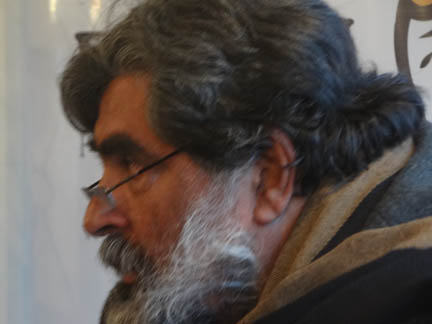Discussing the Tiger-Ruth Padel and Valmik Thapar
-Susan Sharma
Ruth Padel, award winning British Poet is the great great granddaughter of Darwin. She has been visiting India since long with her first visit being to the Panna National Park. When Panna lost all their tigers, Ruth decided that tiger is her call in
life. Over the next years, she learnt the biology and ecology of the tiger and visited more national parks in India, Sumatra, Russia and Bangladesh. She wrote her first book on the tiger a novel " Where the Serpent lives ". Her second book " Tigers in
Red Weather" was written after getting an advance of pound sterling 50,000 from a London publishing house.
Ruth Padel with Prerna Singh Bindra of Bagh Foundation
Bagh foundation organized an evening with Ruth Padel and Valmik Thapar on 28th January, 2015 in New Delhi. Ruth read excerpts from her books and also shared her insights about India's wildlife. Her book highlights the need for science in conservation
and the importance of politician's attitude to conservation. She attributed the comeback of Amur tigers in Russia solely to political will.
She also said that while the problems are global, the solutions are local. Padel's book is based in Sumatra, where she spent time understanding the "co-evolution of man and animal"as she termed it. She writes about the superb understanding of the animal
by villagers who cross its path often. " When a tiger wants to make its presence felt, it breaks a twig" " The presence of the tiger can be felt by all the forest and its inhabitants" "Man cannot be arrogant while entering the forest, the balance and respect
between species has to be maintained" are some of the ground truths gleamed by her through interactions with mountain dwellers of Sumatran jungles.
Is there worship of tigers? Yes, the bad and good tiger is referred to with respect. The stories of Dhukan, the bad tiger regales many. Ruth had a piece of advice: Harness the worship of tigers to protect him; if you don't, the same people will want
a slice of the beauty of the tiger. The worshiper can then turn poacher. Tiger is so "tangled" with nature. "For me tiger is nature, so I write about him, she averred. In response to a question about the place of lions in India, she said "Lion is alien
to India, tiger is the soul of India". A young man wanted to know her opinion on stopping the demand for tiger parts. Who would she blame for the current scenario? Ruth was unequivocal in stating that you cannot blame anyone for the situation as human greed
cannot be controlled. Implementing protection of tigers would seem to be the only way.

Valmik thapar was more forthcoming in his criticism of the current systems in place. "Of the 500 officers trained in wildlife, only 80 are currently holding wildlife related posts. After writing a scathing article in newspapers, he is also bringing forth
a data driven book on India's tiger protection system. He believes that field protection is a deterrent. After the shock of Panna, Ranthambhore (and Sariska) there are scientists and wildlife enthusiasts who have come together in a big way especially in
the South, to help in field protection. Work done by Ullas Karanth and Hemant Kothari are yielding results. The tiger numbers going up in the recent census is proof of the increased protection.
"All wildllifers in the country must unite. Restart with partnerships. Involve youngsters in wildlife protection in Parks. Use links outside government"- Valmik's enthusiasm was contagious. Why can't we have an annual "Embargo China Day", asked
Thapar who has brought out unknown facets of tigers in his latest book "Wild Fire". Tourism has to be a tool for conservation, he said in reply to a question from the audience. Many wildlife protectors like Valmik and Ullas started out as tourists after
all. Tourism must bring gains to the local population. Management of tourism can be outsourced to reputed private agencies. Masaimara, not much bigger than Ranthambhore, thrives on tourism, because 80% of the earnings go to the local population. The ideas
kept pouring in. As Prerna Singh Bindra of Bagh Foundation stood up for thanking everyone, the audience seemed to be absorbing the words of Valmik and Ruth, two individuals-one from India and the other from London who loved the tiger enough to dedicate
a life to it.